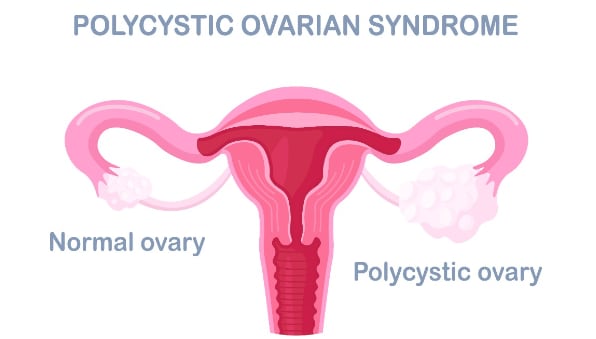Lean PCOS may remain undiagnosed due to normal BMI levels

Polycystic Ovarian Syndrome is a complex and a varied group of endocrine disorder, occurring due to synergistic interaction of genetic, epigenetic, and environmental factors, associated with both reproductive and metabolic abnormalities resulting in short-and long-term consequences on the women’s health. It affects 4-8% of women of reproductive age and is the most common cause of anovulatory infertility (anovulatory refers to lack of ovulation in a menstrual cycle).
Characteristic features include polycystic ovaries, menstrual disturbance and hyperandrogenism. Hyperandrogenism refers to the excessive presence of male sex hormones. This leads to features such as excess body hair (hirsutism), acne in the lower face, neck, chest and upper aspect of the back (seen in 20-40% of PCOS cases) and male pattern balding (androgenic alopecia). Obesity is seen in about 50-76% of cases. These patients present with high body mass index (BMI). Insulin resistance is another important finding in patients presenting with PCOS.
Lean PCOS:
Majority of patients with PCOS have a BMI value which is high and present with typical features such as hyperandrogenism, polycystic ovaries and obesity. A smaller but distinct proportion of women with PCOS have a normal or low BMI (<25kg/m2). Majority of such patients do present with typical symptoms such as irregular menstrual cycles and acne. This kind of presentation of PCOS with BMI <25kg/m2is called as Lean PCOS. Diagnostic work up and approaches to management may be more difficult in those who present with Lean PCOS. This could lead to significant diagnostic delay in women with Lean PCOS, thus exacerbating their complications.
Clinical features:
There is some consensus suggesting that clinical manifestations in lean and obese PCOS are comparable. Women with lean PCOS present with normal or low BMI along with hirsutism, acne, infertility and polycystic ovaries (On ultrasound scan). The blood test findings are similar between the two variants. There will be high levels of LH, reduced levels of FSH and estrogen and high levels of serum insulin. With these clinical features and laboratory findings, a diagnosis of Lean PCOS can be made. Therefore a woman presenting with PCOS like features with a normal BMI and weight can be a candidate for lean PCOS.
Nutritional approach to lean PCOS:
Nutrition is one of the major modifiable risk factors in the management of lean PCOS. Contrary to the common belief of weight loss in obese PCOS, maintaining the body weight is the goal of treatment in lean PCOS. They are encouraged to consume a healthier diet with increased vegetables, fruits, whole grains and legumes to ensure adequate supply of various minerals and vitamins. Calcium and Vitamin D supplementation will help as well. Also, regular exercise will help maintain the body mass index in patients with lean PCOS. These lifestyle modifications will help in promoting a healthy hormonal balance and support regular ovulation. Other specific symptoms can be dealt with by treating with medicines.
Complications like diabetes and insulin resistance may be less severe in women with lean PCOS. It is however imperative to keep a tab on important parameters to ensure that risk for cardiovascular disease and other complications are monitored regularly.
Much more research is needed to determine how lean PCOS is different from non-lean PCOS, especially since PCOS isn’t a one-size-fits-all diagnosis.
The author is technical lead, south, SRL Diagnostics. Views are personal.
Read all the Latest News, Trending News, Cricket News, Bollywood News,
India News and Entertainment News here. Follow us on Facebook, Twitter and Instagram.
For all the latest health News Click Here

